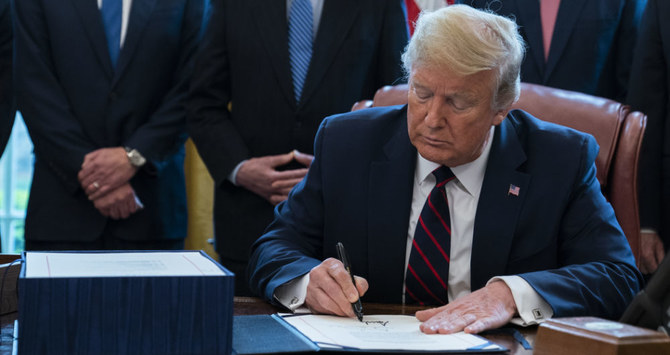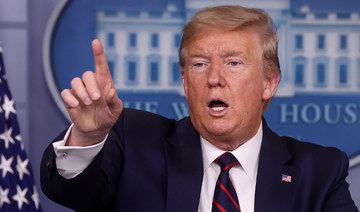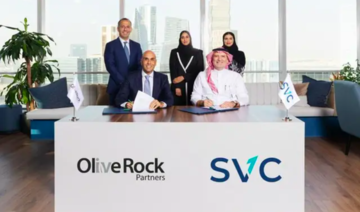WASHINGTON: President Donald Trump signed an unprecedented $2.2 trillion economic rescue package into law Friday, after swift and near-unanimous action by Congress to support businesses, rush resources to overburdened health care providers and help struggling families during the deepening coronavirus epidemic.
Acting with unity and resolve unseen since the 9/11 attacks, Washington moved urgently to stem an economic free fall caused by widespread restrictions meant to slow the spread of the virus that have shuttered schools, closed businesses and brought American life in many places to a virtual standstill.
“This will deliver urgently needed relief,” Trump said as he signed the bill in the Oval Office, flanked only by Republican lawmakers. He thanked members of both parties for putting Americans “first.”
Earlier Friday, the House gave near-unanimous approval by voice vote after an impassioned session conducted along the social distancing guidelines imposed by the crisis. Many lawmakers sped to Washington to participate — their numbers swollen after a maverick Republican signaled he’d try to force a roll call vote — though dozens of others remained safely in their home districts.
The Senate passed the bill unanimously late Wednesday.
“Today we’ve all acknowledged our nation faces an economic and health emergency of historic proportions,” said House Speaker Nancy Pelosi, D-Calif. She said Americans deserve a full-on government response “to address these threats to their lives and their livelihood and they need it now.”
The $2.2 trillion legislation will speed government payments of $1,200 to most Americans and increase jobless benefits for millions of people thrown out of work. Businesses big and small will get loans, grants and tax breaks. It will send unprecedented billions to states and local governments, and the nation’s all but overwhelmed health care system.
“This is not a time for cynicism or invective or second-guessing,” said GOP Whip Liz Cheney of Wyoming. “This is a time to remember that we are citizens of the greatest nation on Earth, that we have overcome every challenge we have faced, and we will overcome this one.”
Despite reservations, arch conservatives joined with progressives like Alexandria Ocasio-Cortez, D-N.Y., to back the bill, which moved quickly through a Congress that’s been battered by partisanship and is itself not immune to the suffering the virus has caused. Reps. Joe Cunningham, D-S.C., and Mike Kelly, R-Pennsylvania, announced Friday that they’d tested positive, bringing the number of infected lawmakers to five.
Tea party Republicans said government orders to shutter businesses merited actions that conflict with their small-government ideology. Liberals accepted generous corporate rescues that accompany larger unemployment benefits, deferrals of student loans, and an enormous surge of funding for health care and other agencies responding to the crisis.
“I’m going to have to vote for something that has things in it that break my heart,” said conservative Rep. David Schweikert, R-Arizona
The bipartisan amity went only so far. Top congressional Democrats were not invited to the White House signing ceremony, said Democratic aides speaking on condition of anonymity to describe the situation.
Many lawmakers summoned the bipartisan spirit of 9/11 and efforts to fight terrorism. Others praised the roles low-income workers play in keeping the country going and the heroism of health care workers. Some, like Iowa Democrat Abby Finkenauer, who had just learned of two additional coronavirus-related deaths in her district, came close to tears.
Others couldn’t restrain their partisan impulses. Republicans chided Democratic leaders for delays and provisions they see as extraneous, such as funding for public broadcasting and the arts; Democrats said too many elements are a bailout for corporations that may not need it.
Still, in a chamber increasingly populated by lawmakers whose chief skill often seems to be partisan attacks, Friday’s debate was a noteworthy break.
“We have no time to dither,” said Rep. Gerald Connolly, D-Virginia “We have no time to engage in ideological or petty partisan fights. Our country needs us as one.”
The run-up to the vote contained an element of drama because libertarian conservative Thomas Massie, R-Kentucky, announced plans to seek a roll call vote.
Leaders of both parties united to prevent that because it would have forced lawmakers back to the Capitol or blemished their voting records if they stayed home. Instead, they made sure enough lawmakers would attend Friday’s session to block Massie’s move under the rules, and lawmakers took the unprecedented step of sitting in the visitors galleries to establish the necessary quorum.
The House promptly adjourned for a weeks-long recess but will return later in the spring to consider further legislation.
“This bill is not only a rescue package, it’s a commitment — a commitment that your government, and the people whom you elected to serve you, will do everything we can to limit the harm and hardship you face, both now and in the foreseeable future,” said Minority Leader Kevin McCarthy, R-Calif.
The massive CARES Act started as a draft plan among Republicans controlling the Senate who were seeking a greater voice in the coronavirus response efforts — especially after Pelosi was a dominant force in earlier legislation imposing a sick leave mandate on businesses.
Senate Majority Leader Mitch McConnell, R-Kentucky, welcomed Democratic participation a week ago, and signed off on a major expansion of unemployment insurance, but his efforts to freeze out Pelosi and force a quick agreement were met with Democratic demands for large infusions of aid to states and hospitals, as well as an assortment of smaller items. McConnell and top Senate Democrat Chuck Schumer of New York wrestled for days, along with Treasury Secretary Steven Mnuchin and other administration officials.
Negotiations finally produced a deal early Wednesday morning, and the Senate passed the measure by a 96-0 vote.
The legislation dwarfs prior Washington responses to crises like 9/11, the 2008 financial crisis, and natural disasters.
Key elements are untested, such as grants to small businesses to keep workers on payroll and complex lending programs to larger businesses. Rebate payments will go to people who have retained their jobs. Agencies like the Small Business Administration and state unemployment systems will be severely taxed, and conservatives fear that a new, generous unemployment benefit will dissuade jobless people from returning to the workforce.
The bill amounts to a bridge loan for much of the economy and carries a price tag that equals half the size of the entire $4 trillion-plus annual federal budget.
The legislation also establishes a $454 billion program for guaranteed, subsidized loans to larger industries in hopes of leveraging up to $4.5 trillion in lending to distressed businesses, states, and municipalities.
There is also $150 billion devoted to the health care system, including $100 billion for grants to hospitals and other health care providers buckling under the strain of COVID-19 caseloads.
It also seeks to strengthen the safety net for the poor and homeless. Schools and students would get relief, small business loans payments would be deferred. Evictions from public housing would be put on pause.
Republicans successfully pressed for an employee retention tax credit designed to help companies keep workers on payroll. Companies would also be able to defer payment of the 6.2% Social Security payroll tax. A huge tax break for interest costs and operating losses limited by the 2017 tax overhaul was restored at a $200 billion cost in a boon for the real estate sector.
Most people who contract the new coronavirus have mild or moderate symptoms, such as fever and cough that clear up in two to three weeks. For some, especially older adults and people with existing health problems, it can cause more severe illness, including pneumonia, or death.
Trump signs $2.2T stimulus after swift congressional votes
https://arab.news/gskqb
Trump signs $2.2T stimulus after swift congressional votes

- Trump: “This will deliver urgently needed relief"
- Washington moved urgently to stem an economic free fall
Meituan looks to hire in Saudi Arabia, indicating food delivery expansion

SHANGHAI: Chinese food delivery giant Meituan is seeking to hire staff for at least eight positions based in Riyadh, in a sign it may be looking to Saudi Arabia to further its global expansion ambitions, according to Reuters.
The jobs ads, which is hiring for KeeTa, the brand name Meituan uses for its food delivery operations in Hong Kong, is seeking candidates with expertise in business development, user acquisition, and customer retention, according to posts seen by Reuters on Linkedin and on Middle Eastern jobs site Bayt.com.
Meituan did not immediately respond to a request for comment by Reuters on its plans for Saudi expansion.
Bloomberg reported earlier on Friday that the Beijing-based firm would make its Middle East debut with Riyadh as the first stop.
Since expanding to Hong Kong in May 2023, Meituan’s first foray outside of mainland China, speculation has persisted that its overseas march would continue as the firm searches for growth opportunities, with the Middle East rumored since last year to be one area of possible expansion.
“We are actively evaluating opportunities in other markets,“ Meituan CEO Wang Xing said during a post-earnings call with analysts last month.
“We have the tech know-how and operational know-how, so we are quietly confident we can enter a new market and find an approach that works for consumers there.”
IMF opens first MENA office in Riyadh

RIYADH: The International Monetary Fund has opened its first office the Middle East and North Africa region in Riyadh.
The office was launched during the Joint Regional Conference on Industrial Policy for Diversification, jointly organized by the IMF and the Ministry of Finance, on April 24.
The new office aims to strengthen capacity building, regional surveillance, and outreach to foster stability, growth, and regional integration, thereby promoting partnerships in the Middle East and beyond, according to the Saudi Press Agency.
Additionally, the office will facilitate closer collaboration between the IMF and regional institutions, governments, and other stakeholders, the SPA report noted, adding that the IMF expressed its appreciation to Saudi Arabia for its financial contribution aimed at enhancing capacity development in its member countries, including fragile states.
Abdoul Aziz Wane, a seasoned IMF director with an extensive understanding of the institution and a broad network of policymakers and academics worldwide, will serve as the first director of the Riyadh office.
Saudi minister to deliver keynote speech at Automechanika Riyadh conference

RIYADH: Saudi Arabia’s Deputy Minister of Investment Transaction Saleh Al-Khabti is set to deliver the keynote speech at a global automotive aftermarket industry conference in Riyadh.
Set to be held from April 30 April to May 2 in the Saudi capital’s International Convention and Exhibition Center, Automechanika Riyadh will welcome more than 340 exhibitors from over 25 countries.
Al-Khabti will make the marquee address on the first day of the event, which will also see participation from Aftab Ahmed, chief advisor for the Automotive Cluster at the National Industrial Development Centre, Ministry of Industry and Mineral Resources.
Saudi Arabia’s automotive sector is undergoing a transformation, with the Kingdom’s Public Investment Fund becoming the major shareholder in US-based electric vehicle manufacturer Lucid, and also striking a deal with Hyundai to collaborate on the construction of a $500 million-manufacturing facility.
Alongside this, Saudi Arabia’s Crown Prince Mohammed bin Salman launched the Kingdom’s first electric vehicle brand in November 2022.
Commenting on the upcoming trade show, Bilal Al-Barmawi, CEO and founder of 1st Arabia Trade Shows & Conferences, said: “It is a great honor for Automechanika Riyadh to be held under the patronage of the Saudi Arabian Ministry of Investment, and we’re grateful for their continued support as the event goes from strength-to-strength.
“The insights and support we’ve already received have been invaluable, and we look forward to continuing this relationship throughout the event and beyond.”
This edition of Automechanika Riyadh will feature seven product focus areas, including parts and components, tyres and batteries, and oils and lubricants.
Accessories and customizing, diagnostics and repairs, and body and paint will also be discussed, as well as care and wash.
Aly Hefny, show manager for Automechanika Riyadh, Messe Frankfurt Middle East, said: “The caliber of speakers confirmed to take part at Automechanika Riyadh is a testament to the event’s growth and prominence within the regional automotive market.
“We have developed a show that goes beyond the norm by providing a platform that supports knowledge sharing and networking while promoting the opportunity to engage with key industry experts and hear the latest developments, trends and innovations changing the dynamics of the automotive sector.”
Aramco-backed S-Oil expects Q2 refining margins to remain steady then trend upward

SEOUL: South Korea’s S-Oil forecast on Friday that second-quarter refining margins will be steady, supported by regular maintenance in the region, then trend upward in tandem with higher demand as the summer season gets underway, according to Reuters.
Over the January-March period, the refiner said it operated the crude distillation units at its 669,000-barrel-per-day oil refinery in the southeastern city of Ulsan at 91.9 percent of capacity, compared with 94 percent in October-December.
S-Oil, whose main shareholder is Saudi Aramco, plans to shut its No. 1 crude distillation unit sometime this year for maintenance, the company said in an earnings presentation, without specifying the time.
Venture investments spark renaissance of Saudi innovation

RIYADH: In Saudi Arabia, a dynamic transformation is unfolding within the entrepreneurial landscape, powered by the robust growth of venture capital, which achieved an impressive 86 percent compound annual growth rate from 2019 to 2023.
This financial infusion has been a game-changer, propelling the Kingdom past the $1 billion mark in venture capital investment last year and igniting a wave of innovative thinking among Saudi entrepreneurs.
Simply put, VC is a category of private market investment and financing. A VC firm raises capital from investors, referred to as Limited Partners, and uses that capital to fund promising startups they have determined as likely to have high growth potential in an emerging category.
A vibrant scene
“The rise of venture capital in Saudi Arabia is fueling a vibrant entrepreneurial scene,” said the founder of Saudi-based VC firm Nama Ventures.
Offering a unique perspective on this financial phenomenon, Mohammed Al-Zubi shared his insights with Arab News about how venture capital is energizing the entrepreneurial scene in the Kingdom.
Al-Zubi described this financial influx as a vital nutrient, fostering a fertile ground for innovation and growth within the Kingdom.

Ripple effects
“Startups get crucial funding, expert guidance, and exit pathways, attracting and retaining ambitious talent. This creates a ripple effect — successful ventures generate high-quality jobs, attracting more skilled professionals and expertise,” Al-Zubi told Arab News.
However, he explained that challenges like limited seed funding and skill mismatch require more attention.
“By fostering a diverse ecosystem and addressing these gaps, Saudi Arabia can harness the power of VC to build a thriving and sustainable entrepreneurial powerhouse,” Al-Zubi added.
Echoing Al-Zubi’s remarks, Tariq bin Hendi, senior partner at Global Ventures, told Arab News that the Kingdom’s VC growth reflects its booming economy.
“Saudi Arabia is a large market with compelling macroeconomics and significant funding, which in turn is re-shaping the regional startup landscape,” Hendi said.
“Increased investment has helped start-ups to digitize, scale and accelerate their business operations — with many success stories: Tarabut, Zension, RedSea, Zid and Hakbah being among the most well-known,” Hendi added.
An innovative economy
Hendi emphasizes the crucial role of venture capital in the economic diversification of Saudi Arabia.
He notes that sectors like agritech, fintech, and cleantech are attracting significant investments, aligning with Saudi Arabia’s Vision 2030 goals.
“The increase in investment saw Saudi Arabia secure MENA’s (Middle East and North Africa) highest VC funding in 2023, which is also aligned with the country’s Vision 2030 objectives,” he stated
“Venture capital’s investment in nascent technologies and innovative ventures allows for early-stage experimentation and for new start-ups to respond to analogue-based problems previously difficult to navigate through digitalization,” Hendi added.
According to him, this synergy between venture capital and startups not only drives technological progress but also offers insights into the regulatory landscape, promoting economic diversity and innovation within the region.
He also highlights the broader impact of venture capital, noting how it enables local businesses to scale and address global challenges, creating job opportunities and demonstrating the Kingdom’s potential in leading sustainable startup growth.
Moreover, Hendi points out that venture capital stimulates international collaboration, attracting global investors and reducing investment risks, further bolstering Saudi Arabia’s position as a dynamic hub for economic activity and innovation.

Furthermore, in his article “Venture Capital Fundamentals: Why VC Is A Driving Force Of Innovation,” Mark Flickinger, general partner and chief operating officer at US-based BIP Ventures, describes VC as a critical factor for economic innovation.
“VC is a rewarding form of private market investment that gives innovators a real chance to transform their ideas into businesses. It connects founders and investors, driving progress and successful outcomes for both,” Flickinger said.
“And for everyone who is part of this virtuous cycle of funding, building, and scaling market-changing businesses, VC is a way to support the impact of the innovation economy – which is the economy today,” he added.
The challenge
Hendi underscores the significant transformation underway in Saudi Arabia, driven by the nation’s economic diversification and digitalization, which is fueling a burgeoning demand for talent and innovation.
With a young, tech-savvy population, the Kingdom is ripe for entrepreneurial ventures, evidenced by success stories like Tabby, he explained.
The growing ecosystem, supported by incubators and successful exits, showcases the country’s potential as a hotbed for technology-driven businesses catering to consumers, enterprises, and government sectors.
The challenge now, according to him, is to further enhance this vibrant environment, making Saudi Arabia even more appealing for entrepreneurs.
He advocates for continued deregulation and the creation of conditions that encourage innovation, enabling entrepreneurs to develop products and services that resonate with consumers and drive economic growth.
The goal is to not only maintain the momentum but to elevate Saudi Arabia’s status as a premier destination for starting and scaling innovative ventures.
How to utilize funding
As VC growth continues to expand, startups are pressured to find efficient ways to use their funding to boost the overall ecosystem.
Al-Zubi shares his advice stating: “Imagine your funding as rocket fuel – you have to blast off without burning it all at once, right?”
“To fly long and far, focus on essentials. Build a stellar team, fuel growth with customer love, and lay a strong financial groundwork,” Al-Zubi added.
“Track your rocket’s path with data, experiment with new maneuvers, and stay tuned to the space weather. Be open with your investors, listen to wise advisors, and don’t be afraid to adjust your trajectory if the wind changes. Remember, long-term success is a marathon, not a sprint. Spend smart, learn fast, and keep your eyes on the stars,” he added.
Furthermore, Hendi advocates for meticulous planning in resource allocation, emphasizing the importance of understanding the market, timing for product launches, and strategic deployment of capital.
According to Hendi, startups must have a clear grasp of their financial roadmap, with a detailed understanding of expected expenditures over set timelines, to ensure sustained growth and success in the evolving economic environment.

















